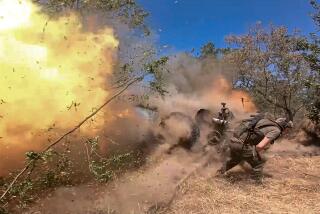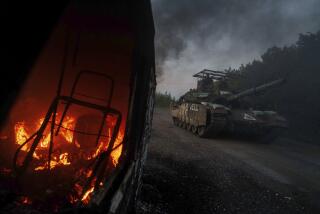Iraqis Pull Back in Kurdish North
- Share via
BANI MAQAN, Iraq — Saddam Hussein’s northern front cracked a bit Thursday when Iraqi army troops, battered for days by U.S. cruise missiles, retreated from hilltop positions near the town of Chamchamal without firing a shot. As Kurdish fighters advanced, civilians looted Iraqi bunkers of grenades, canteens and gas masks.
Kurds were laughing and singing by nightfall as Iraqi units pulled back about 11 miles from Chamchamal west toward the oil-rich city of Kirkuk. A Kurdish military commander said his lightly armed forces -- some of them in taxis and on motorcycles -- filled most of the vacuum and now control an 18-mile-wide front line protected by U.S. warplanes.
The retreat came as more than 1,000 U.S. troops landed on airstrips and parachuted into Kurdish-held territory in northern Iraq. Since war began last week, there has been little action between the Iraqi army and U.S.-allied Kurdish forces, and Turkey’s refusal to let U.S. troops use its territory as a base has prevented a significant American flank in the region.
But Thursday’s pullback suggests that U.S. missiles are beginning to weaken the Iraqi regime’s hold on the northeast. Still, U.S. forces expect to face heavy resistance in Kirkuk.
In addition to being home to Iraq’s richest oil fields, Kirkuk is an important symbol for the Kurds. More than 100,000 of them were exiled from Kirkuk over the last decade, and most are eager to reclaim homes from Arabs who were brought in by Hussein to repopulate the city.
As Iraqi troops retreated Thursday, Kurdish military and security police brandishing Kalashnikov assault rifles seized control of a checkpoint here in Bani Maqan, two miles west of Chamchamal, to prevent Kurd civilians from storming Kirkuk in coming days. Kurdish political leaders have promised the U.S. they would not use the chaos of war as a pretext to retake the city, a move that could trigger ethnic reprisals.
One witness reported that the Iraqi troops loaded into 25 trucks, retreated at midafternoon and garrisoned at the village of Qura Hangir about 12 miles east of Kirkuk. As news of their departure spread over the fields and into Chamchamal, Kurdish fighters, wary of land mines and booby traps, eased up the potholed road to the Bani Maqan checkpoint, where five t guardhouses were abandoned. For Kurds, the hilltop bunkers above the checkpoint -- from which artillery rained on Chamchamal throughout the 1990s -- are the epitome of Hussein’s repression. Commanders tried to warn their giddy fighters to proceed cautiously.
“We should not go there now,” said Mam Rostam, a Kurdish commander, yelling to his men racing ahead into the night. “Be careful not to move your positions too far forward. We are waiting for the U.S. jets to come and bomb.”
But as Rostam spoke, looters swarmed the 12 Iraqi bunkers and grabbed weapons, ammo boxes, heaters and other items. One man rolled a water barrel down the road with his feet while balancing a sack of flour on his shoulders. Another’s shirt was bulging with a stolen cartridge belt and a gas mask.
“I got these weapons from the Iraqi troops,” said Rakout Karim Sharif, holding up a rocket-propelled grenade and smiling. “I took my motorcycle so I could bring more things back,” said Ahmed Jabar Salih, his shoes and his face muddy as he pushed the bike and carried a kerosene heater. “But it broke down. I’m so happy to see our enemy retreating.”
More than a week of U.S. airstrikes have demoralized many soldiers in Hussein’s army, according to Kurdish officials, who have a vast underground network in Kirkuk, Baghdad and other cities.
The Iraqi army “is very afraid,” said Jalal Talabani, leader of the Patriotic Union of Kurdistan, which governs the eastern portion of northern Iraq. “They are afraid to live in their trenches, and now it is raining and they don’t know where to go.” He added there are many deserters and that Hussein is “trying to hide” his forces for battle while attempting to use Islamic militants in terror attacks against U.S. targets.
To discourage surrenders, the Iraqi army has imposed execution units behind troop formations, Kurdish fighters claim. “Ten soldiers tried to surrender Tuesday, but they were caught and taken to villages on the Iraqi side and shot,” one fighter said.
Although the American presence in northern Iraq remains scant compared with the south, U.S. troops can increasingly be seen traveling in buses and trucks and arriving in C-130 transport planes.
The 1,000 soldiers from the Army’s 173rd Airborne Brigade who parachuted early Thursday into Harir, about 60 miles northeast of Irbil, spent most of the day digging foxholes and mounting perimeter patrols. They are in friendly territory controlled by Kurdish fighters who hope to fight alongside U.S. forces against Hussein’s army.
The buildup of U.S. troops in northern Iraq is spurring a search for buildings to base them in, and Kurdish military sources say U.S. officers have asked to take over at least five schools.
Several U.S. troops were later seen moving into two of the schools, Ankawa Primary School and 11 September School. Local residents said they didn’t know whether the school, whose sign was written in Arabic and Kurdish, was named for the attacks on the United States.
A U.S. officer who refused to identify himself asked a reporter not to photograph the troops or identify them in any way because, he said, they feared terrorist attacks.
There are few working military bases in Kurdish-held northern Iraq. After seizing Irbil from Hussein’s forces in an uprising after the 1991 Persian Gulf War, Kurdish guerrillas demolished buildings at a major army base there, converted part of the property into a park and turned the rest into farmland.
Apart from twisted, rusting wrecks of Iraqi army vehicles, all that remains of the Irbil base is the partial ruins of the front gates and the airstrip that Kurdish sources say U.S. forces plan to use.
In addition to targeting Hussein’s forces in the north, the U.S. has been trying to wipe out Ansar al Islam, a band of Islamic militants that controls a sliver of land along the Iranian border. After days of airstrikes on the group’s positions, expectations are growing that U.S. forces, backed by 7,000 fighters, will do battle with the group. Ansar is thought to have 500 to 700 fighters.
Ansar, which the Bush administration says is linked to Al Qaeda, was thought to be responsible for an attempted car bombing Thursday on a road in northern Iraq used by U.S. soldiers and intelligence operatives. The driver of the car pulled up to a checkpoint crowded with refugees and yelled “God is great!” He was quickly shot by Kurdish fighters.
A search of the car found 10 five-gallon jugs of explosives ringed by bottles of gasoline. The attempt followed a car bombing Saturday at the same checkpoint, which killed five people.
*
Fleishman reported from Bani Maqan and Watson from Khabat, Iraq.
More to Read
Sign up for Essential California
The most important California stories and recommendations in your inbox every morning.
You may occasionally receive promotional content from the Los Angeles Times.














